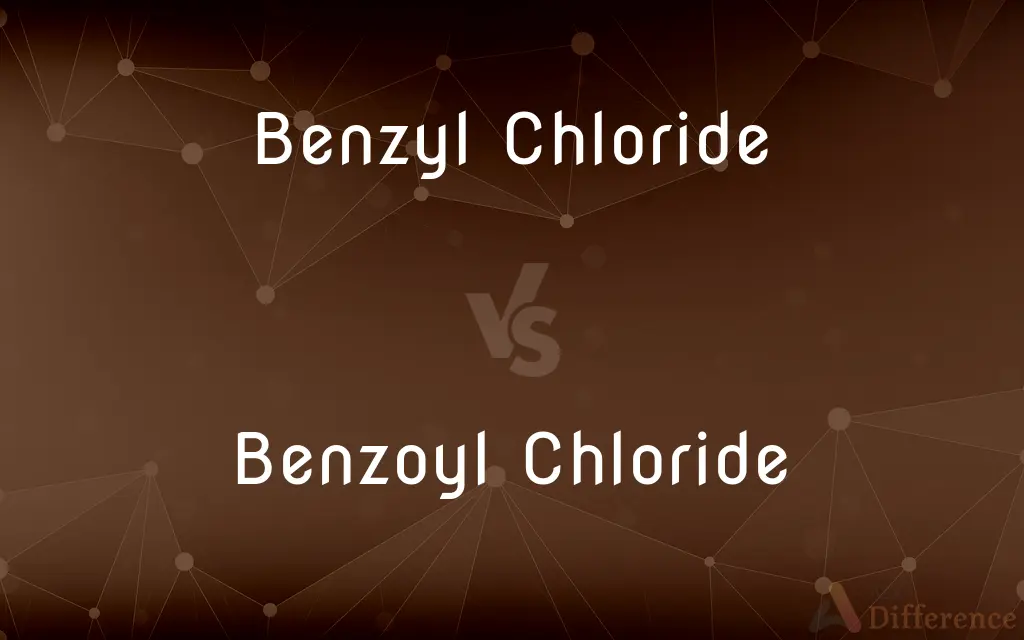Benzyl Chloride vs. Benzoyl Chloride — What's the Difference?
Edited by Tayyaba Rehman — By Maham Liaqat — Published on March 20, 2024
Benzyl chloride (C6H5CH2Cl) is chlorinated aromatic hydrocarbon used in organic synthesis, known for its pungent aroma. Benzoyl chloride (C6H5COCl) is acyl chloride used as reagent in chemistry, characterized by its strong, irritating odor and reactivity.

Difference Between Benzyl Chloride and Benzoyl Chloride
Table of Contents
ADVERTISEMENT
Key Differences
Benzyl chloride and benzoyl chloride, both derived from benzene, exhibit significant differences in structure and chemical behavior. Benzyl chloride, with a chlorine atom attached to a benzene ring through a methylene group, serves primarily in the manufacture of benzyl compounds and as a precursor to benzyl esters and ethers. Benzoyl chloride, featuring a chlorine atom connected to a benzene ring via a carbonyl group, is a potent acylating agent used in the synthesis of benzoyl compounds, including esters and amides.
The physical properties of these compounds differ notably; benzyl chloride is a colorless liquid with a harsh, almond-like odor, while benzoyl chloride is also a colorless liquid but with a more pungent, acrid smell. This difference in odor is a simple yet practical way to distinguish between the two in a lab setting.
Reactivity is a key differentiator. Benzyl chloride reacts with nucleophiles to form substituted benzyl products, whereas benzoyl chloride's acyl chloride functionality makes it highly reactive with water, alcohols, and amines, rapidly forming benzoyl derivatives. This heightened reactivity of benzoyl chloride makes it a valuable reagent in organic synthesis, particularly for introducing the benzoyl protecting group.
Handling and safety concerns also set them apart. Both chemicals are irritants and potentially hazardous, but benzoyl chloride's reactivity, especially with water, requires more stringent precautions to avoid violent reactions. Proper storage and handling, including the use of inert atmospheres for benzoyl chloride, are critical to prevent accidents and exposure.
Applications in synthesis underline their utility; benzyl chloride is instrumental in producing dyes, fragrances, and pharmaceuticals, reflecting its role in adding benzyl groups to various molecules. Benzoyl chloride's utility in forming benzoyl compounds makes it indispensable in synthesizing pharmaceuticals, agrochemicals, and polymers, showcasing its versatility in organic chemistry.
ADVERTISEMENT
Comparison Chart
Molecular Structure
Chlorine attached through methylene group
Chlorine attached through carbonyl group
Physical State
Colorless liquid with harsh, almond-like odor
Colorless liquid with pungent, acrid smell
Reactivity
Forms benzyl compounds
Forms benzoyl derivatives, highly reactive
Handling Safety
Irritant, requires careful handling
More hazardous, reacts violently with water
Main Uses
Dyes, fragrances, pharmaceuticals
Organic synthesis, acylating agent
Compare with Definitions
Benzyl Chloride
Used in manufacturing pharmaceuticals.
Benzyl chloride derivatives are common in allergy medications.
Benzoyl Chloride
Characterized by its strong, irritating odor.
The pungency of benzoyl chloride is notable during handling.
Benzyl Chloride
Almond-like aroma.
Benzyl chloride's smell is reminiscent of bitter almonds.
Benzoyl Chloride
Highly reactive towards water.
Benzoyl chloride must be handled with dry equipment to prevent decomposition.
Benzyl Chloride
Chlorinated aromatic hydrocarbon.
Benzyl chloride's reactivity is utilized in fragrance production.
Benzoyl Chloride
Used in the synthesis of dyes and fragrances.
Benzoyl chloride contributes to the complexity of synthetic scents.
Benzyl Chloride
Colorless liquid with a harsh odor.
The odor of benzyl chloride is noticeable in poorly ventilated labs.
Benzoyl Chloride
Acyl chloride used in benzoylating agents.
Benzoyl chloride is crucial for synthesizing benzoyl peroxide.
Benzyl Chloride
A precursor in the synthesis of benzyl esters.
Benzyl chloride is used to make benzyl alcohol.
Benzoyl Chloride
Forms benzoyl derivatives with amines.
Benzoyl chloride reacts with amines to produce amides.
Common Curiosities
Can benzyl chloride and benzoyl chloride be stored together?
No, their differing reactivities and the highly reactive nature of benzoyl chloride with water necessitate separate, specific storage conditions.
How do the odors of benzyl chloride and benzoyl chloride differ?
Benzyl chloride has a harsh, almond-like odor, whereas benzoyl chloride's odor is more pungent and acrid.
How are benzyl chloride and benzoyl chloride produced?
Both are derived from benzene through chlorination reactions, though the specific processes and intermediates differ.
What makes benzyl chloride a preferred starting material in organic synthesis?
Its stability and ability to introduce the benzyl group into various molecules make it versatile in synthesis.
What are common uses of benzoyl chloride in industry?
Benzoyl chloride is used in the manufacture of pharmaceuticals, agrochemicals, and as an acylating agent in organic synthesis.
Are there any safety precautions specific to benzoyl chloride?
Yes, due to its violent reaction with water, it should be handled with dry tools and stored under inert atmosphere conditions.
What happens when benzoyl chloride is exposed to air?
It can react with moisture in the air, releasing hydrochloric acid fumes, which are corrosive and irritating.
What is benzyl chloride used for?
Benzyl chloride is used in organic synthesis, especially in making dyes, fragrances, and pharmaceuticals.
Why is benzoyl chloride considered highly reactive?
Due to its acyl chloride group, benzoyl chloride reacts vigorously with water, alcohols, and amines, making it a powerful acylating agent.
Why is benzoyl chloride used in acylation reactions?
Its high reactivity allows for the easy transfer of the benzoyl group to other molecules, making it a key reagent in synthesizing complex organic compounds.
How does the molecular structure of benzyl chloride and benzoyl chloride affect their reactivity?
The presence of a methylene group in benzyl chloride makes it less reactive than benzoyl chloride, which contains a highly reactive carbonyl group.
What are the environmental concerns associated with these chemicals?
Both chemicals are toxic and pose risks to aquatic life; their production, use, and disposal require careful management to minimize environmental impact.
What personal protective equipment is recommended when handling these chemicals?
Gloves, goggles, and appropriate respiratory protection are recommended due to their irritant properties and potential toxicity.
Can benzyl chloride be used to make benzoyl chloride?
Indirectly, yes. Benzyl chloride can be oxidized to benzaldehyde, which can then be further converted to benzoyl chloride.
Is there a simple test to distinguish between benzyl chloride and benzoyl chloride?
Yes, adding water can distinguish them; benzoyl chloride will react vigorously, while benzyl chloride's reaction is much less pronounced.
Share Your Discovery

Previous Comparison
FAT vs. FAT32
Next Comparison
Mood Board vs. Concept BoardAuthor Spotlight
Written by
Maham LiaqatEdited by
Tayyaba RehmanTayyaba Rehman is a distinguished writer, currently serving as a primary contributor to askdifference.com. As a researcher in semantics and etymology, Tayyaba's passion for the complexity of languages and their distinctions has found a perfect home on the platform. Tayyaba delves into the intricacies of language, distinguishing between commonly confused words and phrases, thereby providing clarity for readers worldwide.














































